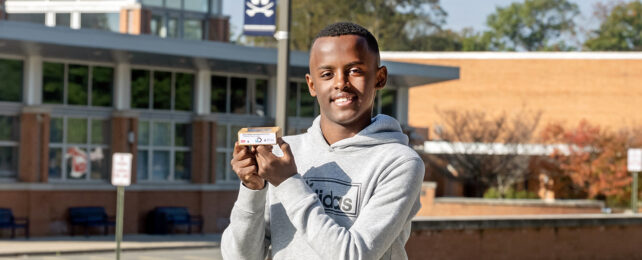A 14-year-old US scientist has developed a soap that could help the body's immune system 'wash away' skin cancer.
The soap has won him the top prize in the Young Scientist's Challenge, an annual competition aimed to encourage children and adolescents to innovate solutions to everyday problems.
The competition is run by US-based multinational 3M Company, which is widely known for developing and patenting the N95 mask in the 1970s and 80s.
Heman Bekel lived in Ethiopia for four years before his family moved to the US, and he says his memories of seeing people working all day under the hot Sun inspired his invention, which he hopes will one day be both affordable and effective.
The soap delivers drugs via the skin that activate the body's immune system to fight cancer cells.
If it works and is determined to be a safe treatment, it could make a big difference for those unable to afford the expensive skin cancer treatments currently available, which can cost around US$40,000.
He began working on the soap at home, but when he became a finalist in 3M's Young Scientist Challenge, he sought help from the University of Virginia and Georgetown University, along with his mentor Deborah Isabelle, a product engineer at 3M.
The main compound involved is imidazoquinoline, which is already used as a topical treatment for conditions like warts, fungal infections, and acne. The FDA has also approved it to treat basal cell carcinoma, one of the skin cancers Heman is concerned about.
We might usually think of soap as something that washes things off, but Heman's soap has an extra ingredient so the cancer-fighting compounds stick around long after the final rinse.
"It does feel a little bit stickier [than normal soap] because it has this lipid-based nanoparticle and the whole point of it is that even once you wash off the soaps, the medicinal parts will stay on your skin," Heman explained in an interview with NPR's Max Barnhart.
The first lipid nanoparticles were approved by the FDA as a drug delivery vehicle in 2018, and are best known for their use in COVID-19 vaccines by Moderna and Pfizer.
But they don't have to be injected to work. When applied to the skin, the lipid nanoparticles form an invisible layer on its surface, which helps them to penetrate the skin while shuttling in those active compounds.
It's still unclear just how well lipid nanoparticles permeate living tissues like skin, but perhaps Heman's invention will help get that testing underway.
"For the most part, I've been sticking to digital molecular testing, which is a fairly new process of testing, where you can test different ingredients and combine different ingredients [in a computer model] and see what they do," Heman told NPR.
"When I did test it on digital models, I got really, really high numbers in terms of the efficiency of it. However, when it comes to actual human testing, I still do not have FDA certification."
Like any good inventor, Heman has tried out his own product, but luckily skin cancer isn't usually an issue for 14-year-olds.
He hopes to get approval for human testing and FDA certification in the next five years.
"By 2028, I hope to turn this passion project into a nonprofit organization where I can provide equitable and accessible skin cancer treatment to as many people as possible," he said.
"I am passionate about finding sustainable solutions to global problems, and I hope to inspire others to do the same."
